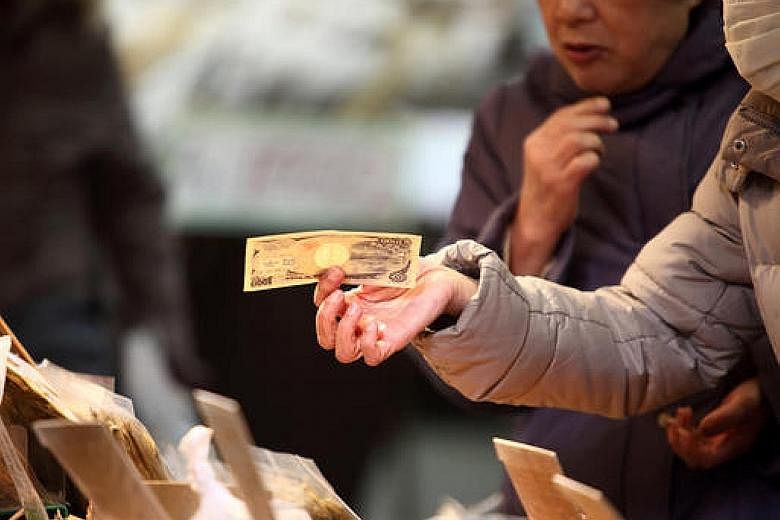Blame it on old habits cultivated during years of economic malaise, or a pervasive sense of security given Japan's low crime rates, or simply mistrust in newfangled technology.
Japan, a pioneer in mobile "e-wallet" payments in 2004, has, ironically, since become a serious laggard on this front.
Cashless payments account for just 19 per cent of the nation's overall retail consumption, the Japan Consumer Credit Association has said. The central government wants to increase this to 40 per cent within the next decade.
The reluctance to embrace cashless payments is not unique to Japan. Singapore Prime Minister Lee Hsien Loong on Sunday highlighted this as an area that the Republic is falling behind in in its drive to become a Smart Nation.
Japan, for all its tech savvy, has managed to be concurrently traditional and futuristic. It has clung on dearly to its love for cash, with many still preferring to grapple with wads of bills of 1,000 yen and above, and even one-yen coins.
And yet Apple Pay, Line Pay and Rakuten's Edy are among payment options accepted by businesses such as convenience stores nationwide, along with the contactless rechargeable IC transport card that is akin to Singapore's ez-link card.
By early next year, Chinese e-commerce leader Alibaba will launch in Japan a localised version of its Alipay digital payment system.
And since the bitcoin cryptocurrency was regulated in April, it too has been accepted at electronics giant Bic Camera and budget carrier Peach. Department store chain Marui also announced this month a trial for bitcoin payments.
The Nikkei daily cited the Nomura Research Institute as estimating Japan's digital payment market to be worth 5.6 trillion yen (S$70 billion) this year - a figure eclipsed by China's 15 trillion yuan (S$3 trillion).
China and Kenya were cited as global leaders in the mobile payment movement in a Bank of Japan (BOJ) report in June last year.
Only 6 per cent of respondents of a BOJ survey last November said they made mobile payments, while another 42 per cent said they were aware their smartphones had such functions but did not use them.
Sociologist Emi Kataoka of Komazawa University in Tokyo told The Straits Times: "Japan places a very high value of trust in its cash. Safety measures embedded in its paper bills make counterfeiting difficult."
This trust is absent in the "invisible" mobile payment system, which remains underutilised, given security and privacy concerns.
In June, eight months after Apple Pay was launched in Japan, a Chinese man was charged with fraud after he allegedly used stolen credit card data to pay for 4.45 million yen worth of cigarettes with an iPhone 7S at a Saitama convenience store.
The BOJ said the rate of mobile payment growth in Japan depends on how fast "this feeling of anxiety among people can be dispelled".
Many elderly Japanese still eschew banks with low interest rates in favour of storing their cash under tatami mats at home, Dr Kataoka said. The low crime rate also means many carry wads of cash around without fear, while decades of economic stagnation have led to wariness about payment methods that make it easy for them to overspend.
Also, cashless payment terminals are still unavailable at many mom-and-pop shops and eateries reluctant to fork out money. Such terminals cost 100,000 yen to set up and come with monthly fees.
But Tokyo is looking to help these businesses modernise by offering subsidies, with an eye on the 2020 Olympic Games.

